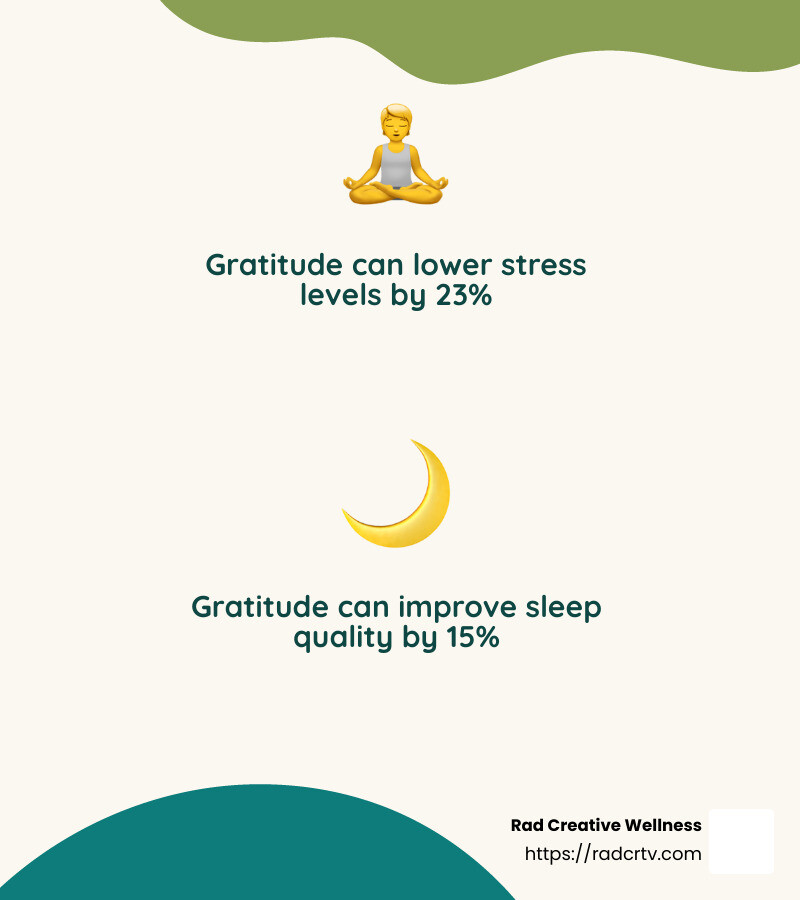
Top 5 Trending Biohacks for Stress Management in 2024
|
|
Time to read 10 min
|
|
Time to read 10 min
If you're looking for effective biohacking for stress, you've come to the right place. Managing stress is essential for maintaining your mental and physical well-being. Here are simple biohacks for stress you can try today:
Stress affects us all, often more than we realize. The good news is there are modern, science-backed strategies capable of changing how we handle those daily pressures. Biohacking for stress is about using straightforward techniques to improve your body's ability to manage stress naturally. At Rad Creative Wellness, we believe in empowering you with practical tools to optimize your health and happiness, enabling you to live your best life.
As a passionate advocate for wellness and biohacking, I combine my expertise in digital storytelling with cutting-edge health practices. Through exploring the latest in biohacking for stress, I aim to provide you with insights that are both practical and transformative.

One of the simplest yet most effective ways to manage stress is to get outside. Nature has a unique ability to calm the mind and reduce anxiety.
Spending time outdoors, whether it's a walk in the park or a hike in the woods, can significantly improve your mood and lower stress levels. The science behind this is fascinating. A study published in the Proceedings of the National Academy of Sciences found that just a leisurely walk in a natural environment can reduce blood flow to the part of the brain associated with negative thinking and rumination. This means that nature helps quiet those obsessive, stressful thoughts.
How does nature achieve this? The gentle sway of leaves, the songs of birds, and the serene beauty of natural surroundings have a calming effect on the mind. Patients recovering from surgery who had a view of a garden or natural landscape experienced faster recovery times and required less pain medication, according to research.
Practical Tips to Get Outside:
Even short bursts of outdoor activity can make a big difference. For example, a 60-minute exposure to nature has been shown to reduce stress and improve the brain’s ability to steer future stressors.
So, the next time you're feeling stressed, step outside. Nature is a powerful, natural biohack for stress reduction. Whether it's a short walk or just sitting under a tree, spending time outdoors can help you feel more relaxed and centered.
Enjoy the benefits of nature's stress-reducing power and watch your mood improve.
If you're looking for a quick and effective way to manage stress, practicing gratitude might be the answer.
Why is gratitude so powerful? Focusing on what you're thankful for can significantly improve your mood, boost self-esteem, and even improve your sleep quality. Research shows that the more you practice gratitude, the more benefits you reap.

How to Practice Gratitude:
Scientific Backing: A study published in the Journal of Happiness Studies found that gratitude journaling can lead to a 23% reduction in stress levels. Additionally, people who practice gratitude regularly have been shown to sleep better and experience fewer symptoms of depression.
Practical Tips to Get Started:
The beauty of gratitude is that it's simple, free, and incredibly effective. Start incorporating gratitude into your daily routine and watch your stress levels decrease, your mood improve, and your sleep quality soar.
Next, let's explore how boosting your vagus nerve can further help in managing stress.
The vagus nerve is a key player in managing stress. It connects the brain to various organs, including the heart and digestive system, helping to regulate bodily functions. Strengthening this nerve, known as improving vagal tone, can significantly reduce stress.
Deep breathing is one of the simplest ways to boost your vagus nerve. Try this:
This technique acts like a mini-massage for your vagus nerve, promoting relaxation.
Cold exposure might sound uncomfortable, but it's highly effective. Cold showers or even splashing your face with cold water can wake up the vagus nerve.
Pro Tip: Start with 30 seconds of cold water at the end of your shower and gradually increase the time.
Laughter is a natural way to stimulate the vagus nerve. It's also a fantastic mood booster.
Fun Fact: Watching a comedy show or sharing jokes with friends can give your vagus nerve a good workout.
Meditation is another excellent method. It promotes a healthy vagal tone and offers a gentle mind-body massage.
Try This: Spend just 5-10 minutes a day in meditation. Focus on your breath and let go of any tension.
Gently massaging behind your earlobe can activate the vagus nerve and promote relaxation.
Quick Tip: Use your fingertips to massage the area behind your earlobes in small, circular motions.
Daily Routine Ideas:
By incorporating these practices into your daily routine, you can actively tone your vagus nerve and experience the benefits of a stronger, more balanced you.
Next, let's explore how breathwork can serve as your body's natural stress reliever.
Breathwork is a simple yet powerful biohack for stress management. It’s like having a built-in stress reliever.
Deep breathing helps calm your thoughts, slow your heart rate, and regulate your nervous system. One effective technique is Paced Breathing. Here’s how:
This technique can be done anytime you feel stressed.
In 1970, a Harvard researcher named Herbert Benson coined the term "The Relaxation Response." His research showed that short periods of meditation focusing on breathing can alter your body's stress response.
Try This: Spend just 5-10 minutes focusing on your breath to trigger this relaxation response.
Breathwork can also improve your mood. Kelly McGonigal, a health psychologist at Stanford, found that just a short burst of exercise or deep breathing can improve your mood.
Fun Fact: Only three minutes of deep breathing or exercise can make you feel happier.
Breathing exercises like Box Breathing are great for reducing stress. Here’s how to do it:
This technique not only reduces stress but also helps you "let go" of tension and boosts mental health quickly.
Daily Routine Ideas:
By incorporating these breathwork practices into your daily routine, you can naturally manage stress and improve your overall well-being.
Next, let's explore how Aromatherapy can use the power of scent to improve your mood and reduce stress.
Aromatherapy is a biohack for stress that uses scents to improve mood and well-being. Certain smells can trigger positive memories and feelings, making you feel more relaxed and happy.
Essential oils are the main tools in aromatherapy. These oils are extracted from plants and have strong smells that can affect your brain and body. Lavender, frankincense, and peppermint are the most common oils for stress relief.
Lavender is known for its calming effects. It can help lower anxiety and improve sleep. A study showed that lavender can decrease cortisol, the stress hormone, in your body.
How to Use:
Frankincense has been used for centuries to promote relaxation and mental clarity. It can help you feel more grounded and less stressed.
How to Use:
Peppermint is refreshing and can help boost your mood and energy levels. It’s also good for relieving headaches and tension.
How to Use:
Smells can trigger emotional and memory centers in your brain, which are part of the limbic system. This system controls many behaviors, including how you react to stress.
Aromatherapy can create new positive memories and feelings, making it a powerful tool for managing stress.
Easy Ways to Incorporate Aromatherapy:
Finding the right scent for you might take some time, but once you do, it can be a simple and effective way to manage stress.
Next, let’s answer some Frequently Asked Questions about Biohacking for Stress.
Biohacking for stress involves using simple, science-backed techniques to improve your body's response to stress. Here are some effective methods:
Circadian Rhythms: Your body follows a natural 24-hour cycle called the circadian rhythm. Keeping this rhythm in sync can help reduce stress. Try to:
Breathwork: Deep breathing exercises can activate your parasympathetic nervous system, which helps you relax. Techniques like deep belly breathing and the Wim Hof Method are great for lowering stress quickly.
Adaptogens: Adaptogens are natural substances that help your body adapt to stress. Popular adaptogens include:
Community Engagement: Having a strong social network can significantly reduce stress. Spend time with friends and family, join clubs or groups, and engage in community activities to feel more connected and supported.
Exercise is a fantastic way to manage stress. Here are some of the best types:
Walking: Simple and effective. A 60-minute walk in nature can reduce stress and improve your mood.
Jogging: Great for releasing endorphins, which are natural stress relievers. Aim for 20-30 minutes a few times a week.
Yoga: Combines physical movement with deep breathing and meditation, making it excellent for stress relief.
Tai Chi: A gentle form of martial arts that focuses on slow, deliberate movements and deep breathing.
Swimming: Provides a full-body workout and the rhythmic nature of swimming can be very calming.
Removing stress from your body involves a combination of physical activities and relaxation techniques:
Deep Breathing: Practice deep breathing exercises like square breathing to quickly reduce stress and tension.
Music: Listening to calming music can lower your heart rate and reduce anxiety.
Walking: A short walk, especially in nature, can help clear your mind and reduce stress.
Sun Exposure: Getting some sun can boost your mood by increasing your vitamin D levels. Just 15 minutes a day can make a difference.
Stretching: Simple stretching exercises can help release tension in your muscles and improve your overall sense of well-being.
By incorporating these biohacks into your daily routine, you can effectively manage and reduce stress, improving your overall health and well-being.
Next, let's explore some Conclusion thoughts on how Rad Creative Wellness can help you on your stress management journey.
At Rad Creative Wellness, we believe that stress management is key to a fulfilling life. Through biohacking, you can take control of your well-being using simple, effective techniques.
Biohacking for stress isn't about making big changes. It's about integrating small, science-backed practices into your daily routine. From getting outside to practicing gratitude, and from enhancing your vagus nerve to engaging in breathwork and aromatherapy, these techniques can make a significant difference.
We offer various tools and resources to help you on this journey. Whether it's through our biohacking devices, wellness programs, or community support, we're here to empower you to transform your health.
Managing stress isn't a one-size-fits-all approach. It's about finding what works best for you and making it a part of your everyday life. So, why not start today? Explore our resources, try out new techniques, and find how biohacking can help you lead a more balanced and stress-free life.
Thank you for joining us on this journey. Here's to a healthier, happier you!